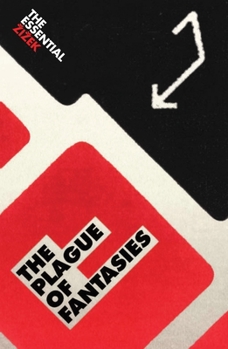The Plague of Fantasies
Select Format
Select Condition 
Book Overview
Modern audiovisual media have spawned a 'plague of fantasies', electronically inspired phantasms that cloud the ability to reason and prevent a true understanding of a world increasingly dominated by... This description may be from another edition of this product.
Format:Paperback
Language:English
ISBN:1844673030
ISBN13:9781844673032
Release Date:January 2009
Publisher:Verso
Length:320 Pages
Weight:0.85 lbs.
Dimensions:1.0" x 5.4" x 7.7"
Customer Reviews
4 ratings
One of Lacan's Best Books--Oops,Sorry, I Meant 'Zizek'
Published by Thriftbooks.com User , 14 years ago
"The Plague of Fantasies" is Zizek at his best: funny, irreverent, brilliant and sometimes just silly. Zizek is a master of critical theory: from Schelling and Hegel to Alain Badiou, he knows it all, and knows it in detail. In this book, Zizek discusses a number of ideas, all of which focus around one or another aspect of Lacanian theory. Make no mistake about it: Zizek is a Lacanian (he may even know Lacan better than Lacan did). He analyzes various aspects of popular culture and leftist politics. Unlike some of his other books, however, this narrative is fast-paced and moves right along. In terms of ideas, he is mostly a passer-on of those which he has derived from others: the violence of interpretation, for instance, in which the deforming of a text's meaning, though untrue to the author's aims, nonetheless produces a truth effect which justifies the deliberate (mis)intepretation, is borrowed from Paul de Man; or the problem of the desublimated Other, which goes something like this: let's say you're having sex with your partner and all of a sudden your mind wanders. What's happened? According to Zizek, borrowing from Lacan here, your partner has (hopefully temporarily) slipped out of the phantasmatic reference frame you've built around him or her, for Zizek insists that we are always viewing others within frames of fantasy, in one way or another. His discussion of the three types of shaven vagina in the book's intro is bold and fun; as is also his discussion of the semiotic differences between French, American and German toilets (perhaps a new explanation for the real [i.e. obscene] causes of the World Wars?) Zizek is at his best and most entertaining in his analyses of movies. In the book's Forward, his comments about John Carpenter's "They Live" is priceless (I'll forgive him his reference to "Spielberg's Star Wars Trilogy,"; after all, one can't get everything right); his discussion of the leading motif of Spielberg's films being about the absent father, or the father figure who has lapsed in his duties and must learn how to make up for his lapse by defending his neglected family against the traumatic impact of the Real of some monstrous force (i.e. Nazis, dinosaurs, aliens from outer space) is a great insight, although he oversteps his bounds when he says that these films are about nothing else. That is false, trust me. There are all kinds of wonderful mythological and cosmological updates and retrievals going on in Spielberg's films. (A dose of heretical Jungian theory here might have helped him out a bit). In any case, this book is a great place to begin if you are interested in reading Zizek. Though I don't always agree with him, he hardly ever fails to entertain me (except when he goes into long pedantic discussions about the function of the Ego in Fichte or Schelling's concept of the Absolute; I mean, come oooon!) In great books, it's the personality of the author that counts, and so one does not read Zizek so much for his ideas (
Lacanian pyschoanalysis applied to politics
Published by Thriftbooks.com User , 21 years ago
Zizek's claim to fame is his rapacious wit, keen insights, and his profound, hilarious and shocking use of anecdotes. Here, Zizek focuses on the relation between fantasy and desire, and the latter he sees as rooted fully in the former. Fantasy, he argues, is the foundation for political and social action. As a Marxist, he makes an interesting some interesting arguments along a line that is seemingly contradictory to his ideological convictions employing Lacan heavily but also drawing upon and offering some interesting interpretations of Hegel. He ends the book with insights on how the digitization of our universe--overly fantasized--as alienated us from our corporeality. This he views negatively as a plague--finally suggesting that the task of critical theory is the inverse of the traditional one starting with concrete social reality and then moving to abstract notions. Rather, the pseudo-concrete and virtual which now structure our lives must be debunked. His writing is erratic but intrepid and certainly worth the effort.
joussance?
Published by Thriftbooks.com User , 25 years ago
hard but joyfull studyng- my best boo
Reading Theory Isn't Supposed to Be This Fun, Is It?
Published by Thriftbooks.com User , 26 years ago
For those who enjoy the challenge of reading high theory but are put off by the dry, abstract, pretentious ramblings that more often than not constitute theoretical writing, Zizek is the theorist for you. Is there another theorist alive who can on one page explicate the finer points of Lacan, Hegel and Kant, while on the next page tie it all in with the three most popular female pubic hair styles, homosexual ; and subtle distinctions among toilet designs in Germany, France, and the United States? Perhaps. But Zizek makes these seemingly awkward transitions and uncommon examples quite smoothly; the outrageous examples aren't forced, nor are they merely for "shock" value. In short, they work to clarify the difficult concepts he is discussing. Although Zizek is not what I'd call an easy read - not by a long shot - he certainly knows how to make a challenge a bit less stressful and - gasp! - fun. END





